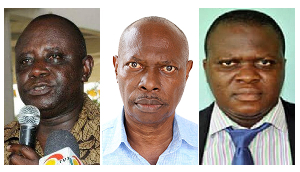Opinions of Thursday, 13 March 2008
Columnist: Ossei, Nana Yaw
National Health Insurance Scheme: Health care for all.
Part 2
Part 1 of my article gave reasons why user fees were introduced into the Ghanaian health care system and the effects it had on the general populace especially the poor. Part 2 of the article will give a general overview of the National Health Insurance Scheme.
Good health is necessary for well-being. Good health is required for economic and social development. Workers have to be healthy to work and children have to be healthy to attend school and partake in other activities. Poor health has another critical impact: it causes poverty, in that large health expenditures can bankrupt families. Health expenditures are a primary cause of impoverishment.
Ghana passed the National Health Insurance Act (NHIA) in 2003, and it became operational in March 2004. The scheme is operated as a decentralised national health insurance system encompassing district mutual health schemes in all districts in Ghana. The scheme enables Ghanaians to obtain at least, the basic healthcare services without paying money at the point of delivery of the service. The rational behind the establishment of the NHIS was to replace the cash-and-carry system which had an adverse effect on the poor and was based on the ability to pay in order to access health care delivery. The NHIS seeks to achieve an equitable access to health care delivery on the basis of need rather than socio-economic status. The NHIS covers those outside of the formal sector employment and it encompasses a mixture of poor and rich people. The scheme has enhanced accessibility of health care for the poor. The central government sets the minimum benefits package, licenses and regulates the health insurance schemes, certifies the providers, and collects a national insurance levy and uses it to subsidise premiums for the poor.
The idea is that, the NHIS will eventually become mandatory, which implies that, all Ghanaians would somehow be compulsorily enrolled. How this will be done is yet to be determined. The NHIS seeks to achieve coverage of 30 to 40 percent of the population by 2010 and 50 to 60 percent by 2015-20. The minimum premium payment permissible under the law by the mutual health insurance schemes is GHC 7.20 ( 72, 000 cedis). Upon payment of this amount, the enrolee is entitled to those minimum health care benefits specified under article 64 of the NHIA Act. The minimum benefits package provides a comprehensive list of services including the following: all emergencies or crisis situations that demand urgent attention, maternity care including prenatal, postnatal, and delivery services, eye services, including cataract removal and eyelid surgery, basic oral health services, certain inpatient services similar to those included for outpatients with the addition of room and board in a general ward and cervical and breast cancer treatment, medications listed on the National Health Insurance Scheme drugs list etc. For the full exhaustive list, please refer to article 64 of the NHIA Act 2003.
The NHIS is financed through a health insurance levy of 2.5 percent on goods and services produced in Ghana or imported albeit with some exceptions, 2.5 percent of the social security and pensions scheme funds, transfers from the state budget allocated to the fund by parliament, returns on investments made by the National Health Insurance Council and voluntary contributions to the fund (grants, donations, gifts, and other sources of financing). The National Health Insurance Council was set up to govern the insurance scheme and reports to the President through the Minister of Health. Why should the NHIC report to the President via the Minister of Health in view of the fact that, the President appoints the council members albeit in consultation with the Council of State? Rather, should the NHIC report directly to Parliament given the fact that, the National Health Insurance Council has to comply with health policy directives issued by the Minister of Health? The council may modify the sources of funding to keep pace with developments in the health insurance industry. Monies for the fund are held in bank accounts approved by the accountant-general. Transfers from the fund to the district mutual health insurance schemes are approved annually by parliament. In June 2005, parliament approved an allocation to the National Health Insurance Fund whereby the national health insurance levy accounted for 77 percent of the total and the Social Security and National Insurance Trust accounted for 23 percent. The collection is in full swing and the National Health Insurance Council has been able to mobilise more than 800 billion cedis. According to President Kuffour, 41 billion cedis from the HIPC initiative was used to fund the scheme at the district level. A similar amount was also set aside for health workers who agreed to work in deprived rural areas. The 2005 National Health Insurance Fund allocation formula was as follows: 140 billion cedis for 1.74 million indigents (poorest Ghanaians), 48 billion cedis for 600,000 people aged 70 and older, 60 billion cedis for 2 million children under 18. Other beneficiaries were 81 billion cedis for 132 financially distressed schemes and 60 billion cedis for Social Security and National Insurance Trust contributors automatically covered under the law. The remainder included operating expenses, investments, and reinsurance of the National Health Insurance Scheme. As a nation, we need to be very mindful about the issue of sustainability of the NHIS.
Social health insurance must be designed in a way that is not only sufficiently inclusive in terms of benefits, but so that it is affordable and sustainable over time. Moreover, it must be implemented in ways that do not exceed the capacity of health systems and that can be regulated to assure quality. The NHIS is a tool for achieving several goals: mobilizing more funds for health, promoting equal access to reasonable health care for the poor, pooling health risks and preventing impoverishment, and improving the efficiency and quality of health care. The design of the NHIS essentially involves maximizing social benefits under financial and political constraints. The policy makers have to decide on at least seven interconnected groups of major questions in order to pursue the goals of the NHIS. For example, policy makers have to trade off between the goals of covering as many poor as possible with the goal of offering them a comprehensive benefits package. The first three questions deals with determining the composition of the contributory, poor, and non-poor self-employed populations. The remaining four questions deal with determining the benefits package, assessing the fiscal capacity to cover the benefits and expand enrolment to achieve universal coverage, determining NHIS governance, and improving the delivery system for better quality and efficiency of health care.
How many people can be enrolled under the contributory regime, who should these people be, and how can premiums be collected from them? The premiums the insured pay are the new source of financing that provides additional funds for health while pooling their risks.
How should “poor” be defined, how many of the poor should be subsidized, how should the subsidy be targeted, how much will this cost, and how will it be financed? Answers to these questions determine the government budget required for funding social health insurance for the poor, how many poor will gain equal financial access to health care, and to what extent health gains will be produced.
How can non-poor self-employed and informal sector workers be enrolled and how can premiums be collected from them? Decisions on these issues influence whether a nation will be able to achieve universal national health insurance and pool health risks widely, and also have the potential to reduce fraudulent claims, because people who are not covered often “borrow” membership cards of those covered so that they can obtain health services.
What is the benefit package for each group and how much will it cost? These decisions determine the premium rates for the contributory regime population, the government budget needed to fund the poor, and people’s access to health care and insurance protection. Today, some district mutual health insurance schemes are charging as much as GHC 20 and GHC 30 against the initial premium of GHC 7.20. Question is, was any actuarial analysis undertaken in terms of cost of premiums and if it was done, was it accurate? Could this mean that, the very people (poor Ghanaians) in which the NHIS was established to help in order for them to have an equitable access to health care could be priced out of the social health insurance scheme due to high premiums?
What is the nation’s fiscal capacity to fund the poor and near-poor to achieve universal coverage, and what is the projected timetable for this? Such planning disciplines decision makers in the adoption of a long-term strategy for national health insurance and considers the steps that have to be taken to achieve universality.
How should the national health insurance be governed? Should the agency be a public agency, a quasi-public agency or a private non-profit entity? What is the best and most viable administrative structure for national health insurance scheme? Decisions on these matters influence the efficiency and effectiveness of NHIS operations. In my next article, I will critique the bureaucratic administrative set up which may hinder the smooth operation of the health insurance scheme.
How can the health insurance scheme improve health delivery? How should providers be contracted and paid? Decisions pertaining to these issues influence the efficiency, cost, and quality of health care, and in turn the population’s health, the premium rates, and the government’s budget for subsidizing the poor.
The scheme’s design has a number of troubling aspects: the administrative structure needs to be articulated better, human resource problems, lack of a computerised and information systems, better financing mechanism for the National Health Insurance Fund and disbursement of funds need to be streamlined with a focus on the scheme’s long-term sustainability, a universal minimum benefits package needs to be spelled out after a proper costing exercise, a clear understanding of how this benefits package interacts with the free public health services provided by the government is needed, the definition of indigents needs to be evaluated to show clearly who the beneficiaries of the subsidy are and whether everyone who needs a subsidy will get it, and the possibility of an uneven playing field needs to be taken into account given the supply-side subsidies available to public providers. My next article will concentrate on the problems and challenges facing the NHIS.
Merely establishing the National Health Insurance Scheme should be termed a success. Compared to the cash-and-carry system of old, the NHIS offers an equitable and affordable access to health care delivery regardless of one’s socio-economic status in society. It is a system based on need rather than on ability to pay. According to the Ministry of Health, the NHIS is operation in all districts of the country. Universal coverage of the NHIS has hit well over 50 percent which is well above initial expectation. As a nation, we can only congratulate the government for introducing such a policy.
However, the NHIS has not been able to eliminate totally the cash-and-carry system. There are lists of health care services which are excluded under the NHIS such as dialysis for chronic renal failure, organ transplantation, heart and brain surgery other than those resulting from accidents, cancer treatment other than cervical and breast cancer, orthoptics, angiography and echocardiography. Ghana as a developing nation cannot afford to have a universal free health care delivery system because, not only is it not feasible but it will be very expensive to manage. The NHIS is the best health care delivery system we can afford to have as a nation for now but collectively, we should continually monitor, evaluate and improve upon it.













